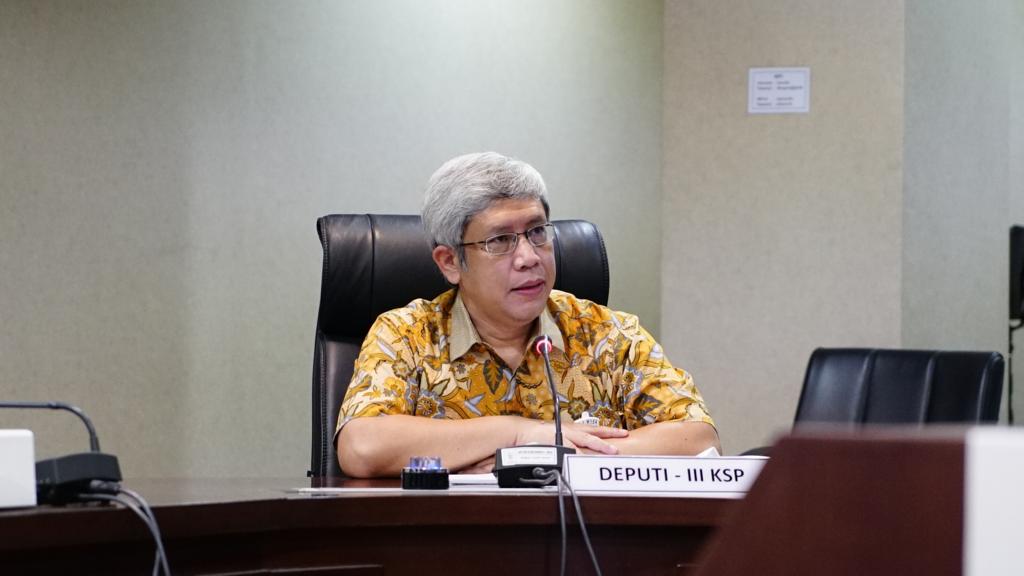JAKARTA— The Indonesian economy has recorded its first growth since the COVID-19 pandemic hit the country last year, largely thanks to the increase of domestic household consumption and the acceleration of global economic recovery.
The Indonesian Statistics Agency (BPS) stated that Indonesia’s domestic product (GDP) grew 7.07 percent year-on-year (yoy) in the second quarter of 2021. This achievement was much better than the growth in the first quarter of 2021 which was still contracting 0.74% (yoy).
“This is a momentum for our economic recovery. This performance is worthy of gratitude as it showcases the strong cooperation of the nation," said the Presidential Chief of Staff, Dr. Moeldoko at the Bina Graha Building, Jakarta, Thursday (5/8).
Moeldoko firmly believed Indonesia could soon get out of the pandemic doom. In addition, the Indonesian people have nailed various tests and have always been able to get out of the crisis. "We certainly hope for the continuing support and cooperation from all parties to overcome the pandemic situation and its economic upheaval," said Moeldoko.
Deputy Chief of Staff for Economy (Deputy III) of the Executive Office of the President (KSP) Panutan S Sulendrakusuma added that the bright economic performance was supported by a number of internal and external factors, including the acceleration of global economic recovery driven by the US and China has boosted Indonesia's exports. It grew 31.78 percent (yoy) in the second quarter of 2021 and the country's trade balance has been in surplus for 14 consecutive months from May 2020 to June 2021.
Domestically, household consumption growth showed a positive percentage of 5.93 (yoy) and 1.27 percent (quarter-to-quarter). The consumption growth itself was supported by various factors, including the higher spending boost through the national economic recovery (PEN) programs such as cash assistance, staple food cards, Family Hope Program (PKH), subsidized electricity bills, productive assistance for micro businesses and so on. What can't be ignored is the encouragement for the middle class to shop through the car purchase tax cut, the home purchase relief, as well as the Proud Made in Indonesia program.
“KSP PEN Monev Team found that the country’s economy in the second quarter was indeed running very well. Even in some ways it is better than the pre pandemic conditions," added Panutan.
In addition, a number of indicators are also supporting the smooth economic growth, including investment in the second quarter of 2021 which grew up to 7.54 percent (yoy). An increase in investment means that there is a potential for an increase in the labor absorption, "The government has a strong determination to continuously encourage investment through various efforts, including the implementation of the Job Creation Law," said Panutan.
The production sectors, which have been put under pressure since the COVID pandemic hammered the global economy, have shown significant improvements as well. After experiencing a contraction in the second quarter of 2020, the manufacturing industry in the second quarter of 2021 grew 6.58 percent (yoy). The growth of the industrial sector was driven, among others, by the non-oil and gas industry, which increased up to 6.91 percent. Meanwhile, the trade sector grew 9.44 percent after four quarters of contraction.
Other sectors such as transportation, accommodation, food and drink, and construction also experienced a high increase compared to the second quarter of 2020. Meanwhile, the agricultural sector only grew 0.38 percent (yoy) mainly due to the decline in rice production after the peak harvest season which took place in the first quarter of 2021. .
However, the government is aware of the serious challenges that may occur in the third quarter of 2021 with the increase of the Delta variant of COVID-19 cases. Some government policies seek to impose restrictions on community activities so that the pandemic can be controlled. However, the government does not just limit activities. The government takes countermeasures, among others, by increasing the PEN budget. The PEN budget was increased from Rp 669.43 trillion to Rp744.75 trillion as the government pledged to boost spending on pandemic management and social protection. "It is hoped that the negative impact of slowing economic activity in the third quarter of 2021 can be tackled," said Panutan.
